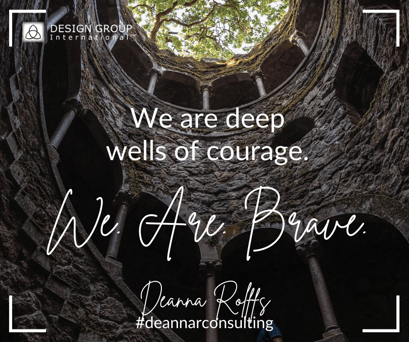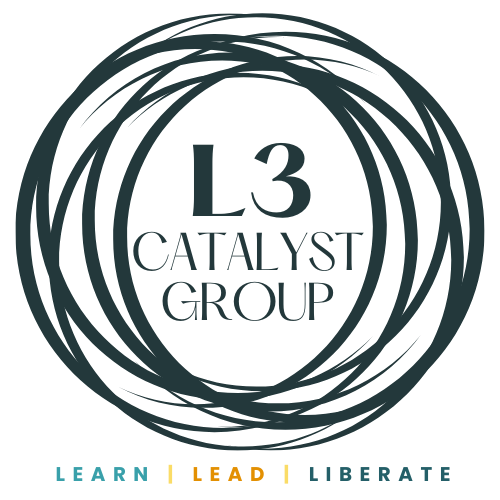I grew up frozen, in fear of the next arrow if I wasn’t perfect. I was enculturated to shrink from authentic feedback. Whispered trash-talking was a common response to any mistake. How can we proceed when perfection is expected?
I received my first consultant role at 26 years old. They were drawn to my non-traditional perspective: a social worker with organizational change background working with a diverse team serving thousands of K-12 educators, administrators, and superintendents. Soon after nervously facilitating a few groups, I learned through the grapevine that one administrator told my boss: “don’t you ever put her in front of my team.” They expected perfection, a specific pedigree.
Tema Okun and Kenneth Jones share with us that perfectionism is a characteristic of White Supremacy Culture. A few examples include:
- more common is to point out either how the person or work is inadequate or even more common, to talk to others about the inadequacies of a person or their work without ever talking directly to them
- mistakes are seen as personal, i.e., they reflect badly on the person making them as opposed to being seen for what they are -- mistakes
- making a mistake is confused with being a mistake, doing wrong with being wrong
- little time, energy, or money put into reflection or identifying lessons learned that could improve practice; in other words, little or no learning from mistakes
- a tendency to identify what is wrong; little ability to identify, name, and appreciate what is right
Antidotes to perfectionism include the following:
- develop a culture of appreciation, where the organization takes time to make sure that people’s work and efforts are appreciated
- develop a learning organization, where it is expected that everyone will make mistakes and those mistakes offer opportunities for learning
- create an environment where people can recognize that mistakes sometimes lead to positive results; separate the person from the mistake
- when offering feedback, always speak to the things that went well before offering criticism
- ask people to offer specific suggestions for how to do things differently when offering criticism
 Leadership, and life, is not about knowing everything, proving yourself, nor aspiring for the fixed mindset of perfection. I commit to being teachable. In that, I’ve found growth, learning, freedom, and transformation.
Leadership, and life, is not about knowing everything, proving yourself, nor aspiring for the fixed mindset of perfection. I commit to being teachable. In that, I’ve found growth, learning, freedom, and transformation.
Perfection is a suffocating illusion.
When I feel perfection’s pressure, three practices have helped me find my strong footing.
First, remind yourself that you are a learner. Yes, you messed up. Commit to learning from it. Focusing on our growth mindset (instead of a fixed mindset) is key.
Second, embrace your vulnerability. Brené Brown shares with us in her research that “vulnerability sounds like truth and feels like courage. Truth and courage aren’t always comfortable, but they are never weakness.”
Thirdly, call a friend or colleague to share the embarrassing stories of messing-up. These conversations usually include empathy and end in fits of laughter. Vulnerability is truth: learning from mistakes, asking a hard question while your voice shakes, or risking to fight injustice.
Vulnerability sounds like truth. Vulnerability feels like courage.
I was taught to construct a façade, hiding perceived weaknesses. I clung tightly to the emperor’s new clothes of self-protection, in fear that there was no depth to me.

We are all deep, wells of courage. We ground ourselves with people that will listen to our fears, laugh with us, and encourage us to stand up, brush off and try again, this time with a knowing smile on our faces. We. Are. Brave.
How are you finding your courage today instead of killing your soul with perfection?
Fellow leaders and learners, I wish you courage and resilience for the journey.
Peace to you,


What I’m Reading
Regarding Overcoming Perfectionism:
- Characteristics of White Supremacy Culture From Dismantling Racism: A Workbook for Social Change Groups, by Kenneth Jones and Tema Okun, ChangeWork, 2001 by Showing Up for Racial Justice (SURJ).
- Perfectionism Will Slow You Down in a Crisis by Harvard Business Review
- Fixed vs. Growth: The Two Basic Mindsets That Shape Our Lives by BrainPickings.org
- Brené Brown TedXHouston The Power of Vulnerability

Questions for Consideration
Regarding Overcoming Perfectionism:
- What helps you get free of perfectionism’s claws?
- What ways have you embraced growth mindset or vulnerability?
- How has vulnerability opened you to laughter, joy, bravery? How are these building blocks for your leadership journey?
- How have you seen the white supremacy culture characteristics and antidotes of perfection
 Upcoming
Upcoming
Leadership & Learning Topics:
- Part 1: Anti-White Supremacy: Who Am I, as a White Person, to be Anti-White Supremacist?
- Part 2: Anti-White Supremacy: Mileposts on My Messy Anti-White Supremacy Journey
- Part 3: Anti-White Supremacy: Calls to Action for White People Wanting to Be Anti-Racist and Anti-White Supremacist
Tags:
Brene Brown, courage, community, learning, White Supremacy Culture, vulnerability, growth mindset, leadership, perfectionism, joy, laughter, power
February 10, 2021




Comments